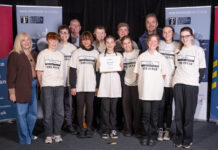
KEEPMOAT has had its plans to halve emissions by 2032 (from 2022) officially verified by the Science Based Targets Initiative (SBTi).
The firm joins three other UK housebuilders in gaining verification for a net zero target at a scale and pace aligned with global efforts to keep warming to 1.5 degrees.
As part of its net zero pledge, Keepmoat has set both near-term and long-term targets to help reach this milestone.
The near-term targets will be met by 2032 and will see the housebuilder reduce its ‘direct’ scope one and two carbon emissions by 51% (from 2022). The cause of scope one and two emissions is primarily from the construction site use of diesel in generators and telehandlers.
The Keepmoat team will use behavioural change and technological advancement to reduce its diesel consumption through a series of tactics, including using hybrid generators, which use batteries to reduce fuel use, and closely monitoring telehandler use. Keepmoat is also continually increasing the number of electric vehicles within its fleet.
An additional step in achieving its near-term targets will see Keepmoat commit to reducing its scope three emissions, which are caused by the customer use of the homes it builds and carbon in the goods and services it purchases. Reducing these emissions will be tackled by home electrification driven by the UK’s upcoming future homes standard legislation and by closely engaging with materials suppliers and contracted services such as groundworks. Keepmoat has committed to reduce its scope three emissions by 59% per square metre build area by 2032 (from 2022).
Tim Beale, CEO at Keepmoat, said, “Our industry is going through an important low carbon transition to tackle the issue of climate change. New homes are far more energy efficient and low carbon than older properties. By setting science-based targets we’re demonstrating our commitment to follow through on that mission in the build process and supply chain too.”
John Bowden, sustainability director at Keepmoat, added, “Thanks to cleaner electricity, there’s a great opportunity to build efficient, electric-first homes that are zero carbon ready. Our partnership model enables us to take part in important pilots of sustainable homebuilding, such as Gedling Green in Nottinghamshire, where we’re building 33 homes to the future homes standard in advance of that standard coming in.
“The challenge facing the industry now is to reduce diesel use on site and to find ways to decarbonise building materials and heavy machinery used by our supplier. This can only be done by the industry working together.”
The Science Based Targets initiative (SBTi) is a collaboration between CDP, the United Nations Global Compact, World Resources Institute (WRI), and the World Wide Fund for Nature (WWF). The SBTi defines and promotes best practice in science-based target setting and independently assesses companies’ targets.








